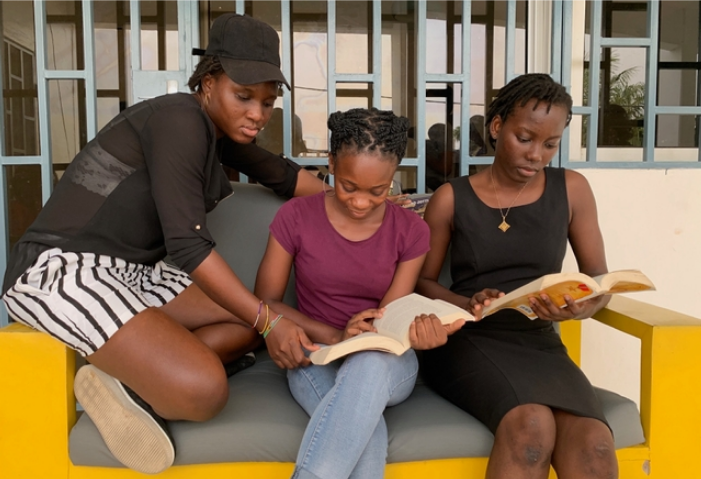The Case for Multilingual Publishing Within the Children's Book Industry in Africa
Guest Author: Christian Elongué, president of Muna Kalati, elongue@munakalati.org
Local languages are many, but underused.
Africa is the second-largest continent in the world and the most multilingual. According to the African Language Program at Harvard, there are between 1000 and 2000 languages spoken on the continent, with possibly as many as 8000 dialects. These indigenous languages have been negatively affected as a result of colonization, which almost led to their extinction because of the impact of official languages, such as English, French, and Portuguese, and their ascribed privileges. Today, African languages continue to be marginalized and remain underused by native speakers, who see them as being inferior to colonial languages.
Even when indigenous African languages like Arabic (in Somalia) or Swahili (in Kenya) are in a co-official role, the ex-colonial language still enjoys greater prestige than the local official language. [Note: In countries such as Algeria, Egypt, and Libya, Arabic, the official language, is also a local medium; in Morocco and South Africa, more than one local language is constitutionally recognized as official in co-equal status with English]. In countries where the ex-colonial language is not official by law, de facto it often plays an important official role and enjoys significant prestige. This is the case in Cameroon, the only African country with more than one ex-colonial language, English and French, as official languages. As a result, most of the existing storybooks and reading materials for children are in English or French. In contrast, South Africa is one of the few African nations where more than 10% of books’ sales are directly in one of the nine indigenous languages: English-language publications accounted for 72% of sales across all sectors, while those in Afrikaans accounts for 16% and those in isiZulu, IsiXhosa, Sepedi and Setswana account for 12%. These two examples confirm that interest for books published directly in African languages is extremely small.
This under-utilization of African languages affects the quality of education delivery, especially the foundational literacy programs for children. In April 2023, UNESCO Institute for Statistics affirmed that in Sub-Saharan Africa, 202 million children and adolescents are still not getting the minimum in reading and math. Across the region, nearly nine out of ten children between the ages of about 6 and 14 will not meet minimum proficiency levels in reading and math. The Global Book Fund Feasibility Study revealed that a significant contributing factor to this crisis is the lack of reading materials available in languages familiar to children. It is a well known fact that using mother tongue languages in reading materials is more advantageous in learning since it accelerates comprehension, vocabulary acquisition, and cultural preservation. And this is further reinforcing the growing interest in bilingual education in sub-Saharan Africa, where there is an increased need to produce more children's books, textbooks and early readers in African languages.
Credit: Foumi @ iwaria
At the United Nation’s 2022 Transforming Education Summit (TES) in New York City, the Global Book Alliance together with the Association for the Development of Education in Africa (ADEA), advocated to increase production of high-quality textbooks and reading books, in children’s own languages. At the TES, all education stakeholders agreed on the need for more children's books written in the languages children speak at home, and with vocabulary and syntax that are within their competence. For these books to be culturally and linguistically relevant, and supportive of children’s sense of belonging, the content should be created and published by people who are grounded in the children’s own cultures. In this regard, academics Grassi and Barker recommended the use of students’ local language for content instruction as it increases students’ academic achievement. Researchers Doiron and Asselin also confirmed that learning to read is most successful with mother tongue texts.
The need to adopt an integral and holistic approach
In many African countries, most of the efforts that aimed at solving the reading crisis have not been holistic, therefore tackling one aspect of the problem, while neglecting other fundamental aspects. Various stakeholders in the book value chain need to collaborate and contribute to the process.
1. If you are a publisher
You could actively seek out and collaborate with engaged writers who can create storybooks and learning materials in local languages. Proactively and strategically creating the demand for local language texts will help to place early publishers in a position to realize greater economic benefits.
Solidarity co-publishing and publishing partnerships are also good practices to be observed as it helps in minimizing the entire production and distribution costs.
You could also allocate resources and provide support to authors, illustrators, and translators to facilitate the production of high-quality storybooks and other learning resources. This includes financial assistance, training, and access to publishing platforms. The African Storybook Project in South Africa, for example,collaborates with local authors, illustrators, and translators to create engaging and culturally relevant content. Another example from Ghana is Sub-Saharan Publishers of Akoss Ofori-Mensah, who works closely with authors and translators to produce literature that reflects African cultures and languages.
2. If you are an author, illustrator, or translator
You could contribute with your skills and creativity to the production of storybooks. Do not run away from writing in your local language on the basis that the market size is small. If you don’t start now, nothing shall ever change. That’s what writers from literary collectives like Jalada Africa or African Writers Series understood and they have been facilitating the creation of stories, poems, and essays in various African languages. They also provide a platform for writers to share their work and actively seek contributions in local languages.
If you have already written, translated, or published in your local language, establish mentorship programs like the renowned translator Anthea Bell to inspire and nurture others. Currently, there are very few trained literary translators with expertise in children's books. Mentorship could help train more translators and thus foster a sustainable ecosystem for local language storybook production.
3. If you are an educator or school leader
First, you could advocate for local language literacy in your school, community, or country. If there is a dominant local language in your community, try to find a bilingual reading material and experiment teaching through it, in partnership with your school administration and parent-teacher associations. In different African countries, educators have also initiated national reading campaigns (e.g., "Kenya Reads" or “Ghana Reads”), where they showcased the importance of reading and literacy in local languages. They actively encouraged the use of storybooks in African languages in classrooms and often provide training to teachers on effective instructional strategies.
Second, where appropriate, you can incorporate storybooks in your local language into the curriculum to provide students with opportunities to engage with their own culture and language. For example, the African Storybook Project collaborates with schools to incorporate storybooks in local African languages into the curriculum. Educators from the project work closely to identify relevant materials, develop lesson plans, and facilitate the use of these books in classrooms. In Tanzania, the Maa Language Project improved literacy and education in the Maasai community by producing storybooks in the Maasai language. Educators and schools collaborated with community members to develop and distribute these materials.
4. If you are a government official or policy maker
Governments and policy makers play a crucial role in developing language policies that support the production and promotion of reading materials in local African languages. They can allocate funding, provide incentives, and create supportive frameworks to encourage publishers, authors, and translators to produce materials in local languages. In South Africa, the Department of Basic Education (DBE) has previously supported publishers, authors, and translators to develop and distribute reading materials in local languages.
National Book Development Councils, present in most African countries, can also intensify their engagement with publishers to promote the production of reading materials in local languages. They should strengthen their support and funding to encourage publishers to invest in local language materials. For example, the Ghana Book Development Council (GBDC) through the Executive Director, Ms Ernesticia Lartey Asuinura, works closely with international organizations and local publishers to develop strategies that promote the creation and distribution of reading resources in Ghanaian languages and ensure their availability in schools and communities. Policymakers can also follow good practices from the South African government's Department of Arts and Culture which implemented policies that prioritized the preservation and promotion of local languages through incentives, grants, and recognition for publishers, authors, and translators working in those languages.
5. If you are in the development sector as a community or NGO leader
First, you can initiate or support community-based publishing initiatives that focus on creating storybooks in local languages. The African Library and Information Associations uses a grassroots approach to promote reading in African languages. They work with NGOs and community organizations to establish libraries and resource centers that offer reading materials in local languages.
Second, you can organize literacy campaigns and events that highlight the importance of reading in local languages. Muna Kalati has organized several advocacy programs such as Muna Kalati Talks to raise awareness and encourage reading and publishing in African languages. StoryWeaver by Pratham Books is another initiative that enables the creation and sharing of storybooks in African languages. NGOs and community organizations collaborate with Pratham Books to translate and adapt stories.
In conclusion, the need for cultural and language diversity in global children literature is increasing. Translation and bilingual publishing are just two ways of growing the existing body of children and young adult books from diverse continents, especially in African languages. A collective effort which implements the above recommendations and new ideas will contribute to fostering literacy, cultural preservation, and educational development in African communities.
Stay tuned to the Global Book Alliance for more content like this guest blog and more!



